

The most common decline is dementia. This cognitive impairment negatively impacts both individuals as well as their families, which can lead to a significant downfall of quality of life and daily-life functional abilities. Physical activities - by staying active have shown to lessen and reduce probability of these cognitive impairments. Hence, it is essential for older adults to be aware that staying active is important in maintaining cognitive abilities even when age advances. An investigation into the prevalence of cognitive impairment and the performance of older adults in Guilan province.
IMH: Prevalence of Dementia among Older Adults in Singapore. Age is the Greatest Risk Factor for Cognitive Impairments. Cognitive Health in Ageing research study. Active older adults less likely to become cognitively impaired, UF researchers find. Study Shows Staying Mentally Active Reduces Risk Of Cognitive Impairment. Mediating Age-related Cognitive Decline Through Lifestyle Activities: A Brief Review Of The Effects Of Physical Exercise And Sports-playing On Older Adult Cognition. Keywords Cognitive functioning; Brain health; Working memory; Eye diseases; Diabetes mellitus Introduction As we age, we experience changes in our ability to carry out complex, yet quotidian tasks, such as driving, which requires the possession of sufficient perceptual and cognitive skills.
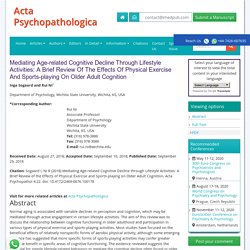
Contributing factors likely involve normative cognitive declines that are outward manifestations of the inherent neurophysiological changes that take place within the aging brain. Cognitive Benefits of Exercise for Seniors. SOCIAL ENGAGEMENT AND COGNITIVE FUNCTION IN OLD AGE. Cognitive stimulation activities for elderly, seniors & adults. Do Lifestyle Activities Protect Against Cognitive Decline in Aging? A Review. Cognitive Health and Older Adults. Cognitive health—the ability to clearly think, learn, and remember—is an important component of brain health.
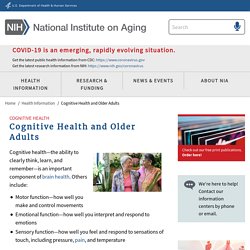
Others include: Best Water Aerobics Exercise Routines for Seniors - The Helping Home. When it comes to living healthy, we all know that following a regular exercise routine is key.

And the older we get, the more important exercise becomes in order to stave off the various effects that aging has on the body. The ability to engage in vigorous, fast-paced workouts diminishes with age, so many Seniors choose more forgiving forms of exercise such as golf, walking, and yoga. Low-impact physical activities such as these are ideal for older adults because they put less strain on joints and result in fewer injuries compared to high-impact sports like basketball or tennis. Although low-impact exercises are easier on the body, they often fail to deliver the same results as their high-impact counterparts. As a result, many Seniors may not be getting enough of the right kinds of exercise. Best Water Aerobics Exercise Routines. Cognitive Benefits of Social Dancing and Walking in Old Age: The Dancing Mind Randomized Controlled Trial. The Impact of Tai Chi on Cognitive Performance in Older Adults: A Systematic Review and Meta-Analysis.
Aerobics Might Boost Brain Health for Older Adults - MedicineNet. Latest Exercise & Fitness News TUESDAY, Nov. 12 (HealthDay News) -- Older adults can boost their brain health by engaging in aerobic exercise, according to a new study.
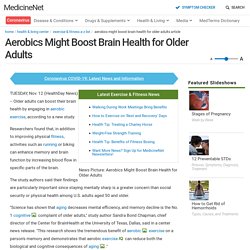
Researchers found that, in addition to improving physical fitness, activities such as running or biking can enhance memory and brain function by increasing blood flow in specific parts of the brain. The study authors said their findings are particularly important since staying mentally sharp is a greater concern than social security or physical health among U.S. adults aged 50 and older. "Science has shown that aging decreases mental efficiency, and memory decline is the No. 1 cognitive complaint of older adults," study author Sandra Bond Chapman, chief director of the Center for BrainHealth at the University of Texas, Dallas, said in a center news release. The 12-week study involved sedentary adults between the ages of 57 and 75. -- Mary Elizabeth Dallas Copyright © 2013 HealthDay.
References. Effect of board game activities on cognitive function improvement among older adults in adult day care centers: Social Work in Health Care: Vol 58, No 9. Stimulating leisure activities are considered as possible protective factors against dementia and cognitive decline in older adults, particularly due to the enhancement of cognitive reserve.
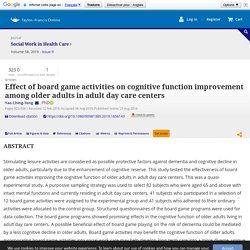
This study tested the effectiveness of board game activities improving the cognitive function of older adults in adult day care centers. This was a quasi‐experimental study. A purposive sampling strategy was used to select 82 subjects who were aged 65 and above with intact mental functions and currently residing in adult day care centers. 41 subjects who participated in a selection of 12 board game activities were assigned to the experimental group and 41 subjects who adhered to their ordinary activities were allocated to the control group. Structured questionnaires of the board game programs were used for data collection. Cognitive benefits of computer games for older adults. Effects of music learning and piano practice on cognitive function, mood and quality of life in older adults. Social Engagement and Cognition - When I'm 64 - NCBI Bookshelf.
Back to school: Learning a new skill can slow cognitive aging. Active aging involves more than moving your body.
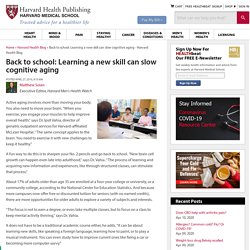
You also need to move your brain. “When you exercise, you engage your muscles to help improve overall health,” says Dr. Ipsit Vahia, director of geriatric outpatient services for Harvard-affiliated McLean Hospital. “The same concept applies to the brain. You need to exercise it with new challenges to keep it healthy.” A fun way to do this is to sharpen your No. 2 pencils and go back to school. About 17% of adults older than age 35 are enrolled at a four-year college or university, or a community college, according to the National Center for Education Statistics.
“The focus is not to earn a degree, or even take multiple classes, but to focus on a class to keep mental activity thriving,” says Dr. It does not have to be a traditional academic course either, he adds. Boosting brain power Research has long shown that new knowledge pays off. But class attendance is not enough. Time to enroll Choose a subject you enjoy or are curious about. Caregiving Welfare Association - Dementia Early Intervention programme. Dementia is a chronic, progressive deterioration of the mental function which is usually characterized by the loss of memory.
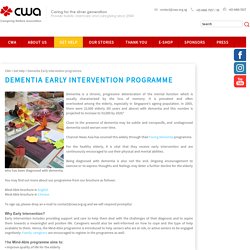
It is prevalent and often overlooked among the elderly, especially in Singapore's ageing population. In 2005, there were 22,000 elderly (65 years and above) with dementia and this number is projected to increase to 53,000 by 2020.* Clues to the presence of dementia may be subtle and nonspecific, and undiagnosed dementia could worsen over time. Channel News Asia has covered this widely through their Facing Dementiaprogramme. For the healthy elderly, it is vital that they receive early intervention and are continuously encouraged to use their physical and mental abilities. Being diagnosed with dementia is also not the end.
To sign up, please drop an e-mail to contact@cwa.org.sg and we will respond promptly! SilverActivities - Games and Activities For Elderly in Singapore.